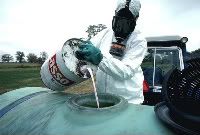How Close to Sustainable Agriculture Are We?
“Sustainability” is such an important concept in our world today, and it’s magnificent to see so many people and corporate entities working hard to contemplate the effects their actions have on posterity. On the other hand, we come across atrocities every day that demonstrate how a great many of our deeds and policies run 180 degrees counter to this notion.
Here’s a good example, revealed in this interview on Democracy Now in which medical ethicist Harriet Washington discusses the situation of Monsanto’s dealings with the desperately poor, disaster-ravaged farmers of Haiti. If you’re able to read this without your heart pounding in anger and disgust, you’re a stronger person than I.
AMY GOODMAN: Our guest for the hour is Harriet Washington, medical ethicist, author of the book Deadly Monopolies: The Shocking Corporate Takeover of Life Itself—And the Consequences for Your Health and Our Medical Future, also author of Medical Apartheid, which won a National Book Critics Circle Award. She has been a fellow in medical ethics at Harvard Medical School and worked as a senior research scholar at the National Center for Bioethics at Tuskegee University.
Harriet Washington, talk about Haiti and Monsanto.
HARRIET WASHINGTON: Right. Haiti, after being devastated, of course, by the earthquake, was already poor. People were already hungry. But hunger became critical. It was a crisis. So Monsanto very generously offered to donate seed. It used the word “donate,” and the news accounts used the word “donate,” but the interesting thing to me was that, although it was going to donate the seed to the Haitian government, the poor peasant farmers would have to pay for the seed.
AMY GOODMAN: Pay who?
HARRIET WASHINGTON: They would have to pay the government. Monsanto was giving the seed to Haiti. The farmers would have to pay the Haitian government and then receive the seed, at a lower price, but still, these are poor people, and it was going to be a burden on them. But still, seed was hard to come by for Haiti, and so the Haitian government was very grateful to get it. The Haitian farmers, though, on the other hand, said that they were going to burn the Monsanto seed. They wanted no part of it. Why? They wanted no part of the seed because they knew what had happened in India and other countries when Monsanto had donated seed. The seed donated by Monsanto was either hybrid seed, which, when planted, might yield a normal crop, but you couldn’t take the seed and replant it, which poor peasant farmers needed to be able to do to stay in business.
AMY GOODMAN: It’s what is known as a Terminator seed?
HARRIET WASHINGTON: Right, exactly, Terminator seed technology. And so—
AMY GOODMAN: Which means it—
HARRIET WASHINGTON: It means that you can’t—you can’t replant it. You have to—you have to buy seed from Monsanto every single planting year. Then they also—Monsanto also wanted to donate Roundup Ready seed, which the Haitian government refused. And why would it refuse it? Because in India and other countries, a Roundup Ready seed is seed that is resistant to the herbicide Roundup, a very dangerous, poisonous herbicide. And the idea is that instead of having to till the land, you take the seed, you plant it, and then you douse everything in the area with this very toxic, very expensive herbicide, also made by Monsanto—
AMY GOODMAN: Called Roundup.
HARRIET WASHINGTON: Called Roundup. And then—glyphosate—and then only—only the seed will survive. That’s in theory. But in reality, first of all, Roundup is so toxic that, in this country, they won’t even sell it to individuals, because you need special gear, and they’re afraid people will not have the special protective gear. In the developing world, they’re not so nice. They sell it to anybody. And in the developing world, water is often hard to come by and very expensive. And yet, this seed does not do well in arid environments. So, the poor farmers now have to buy this very expensive pesticide, they have to buy water. Very quickly, they find themselves in horrible debt.
In India, the debt is so overwhelming that farmers can no longer get loans from the bank. They have to go to money lenders, who will loan them money, but only in exchange for the deed to their farm. And that’s why in India there have been hundreds of thousands of suicides of farmers. Suicide is an occupational hazard, and many people blame Monsanto for distributing the seed, which has made a difficult, cut-and-growing economy completely hopeless for these farmers. Haitians knew about this, and the Haitian peasants said, “We don’t want that to happen to us.”
AMY GOODMAN: So they didn’t have to buy the seed, then, from the government.
HARRIET WASHINGTON: No, they didn’t have to. However, they still have a quandary in that they don’t have another source of seed. I mean, the government has very limited quantities. They have very little money. So, they’re still in a bind. But even so, they are wise enough to know they don’t want to go down India’s road.

